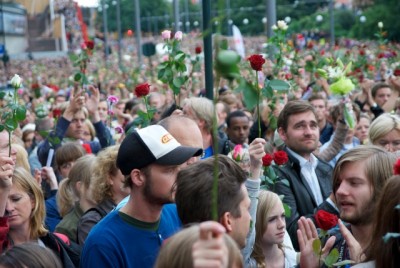Two months after Norway was hit by deadly terrorist attacks, Norwegians are showing themselves to once again think and react differently than terror victims might elsewhere. A new survey suggests that Norwegians are now more skeptical towards anti-terrorism measures, not less.

The survey results, published in newspaper Aftenposten on the two-month anniversary of the July 22 terrorist attacks, surprised the researchers behind it but they offer some explanation. Much of it has to do with the official government response to the attacks, which called for “more democracy” and “more openness.”
The survey was conducted in late August by researchers at the University of Bergen. It aimed to gauge whether Norwegian attitudes towards anti-terrorism measures had changed since an earlier survey in 2006, after terrorist attacks in the US, London and Madrid.
In the survey five years ago, a majority of Norwegians showed relatively strong support for three specific methods of trying to prevent terrorism: 53 percent agreed that the authorities should be allowed to keep terror suspects in custody without taking them to court, 58 percent agreed that police should be able to stop and search suspects on the street, and fully 85 percent thought it was acceptable for the authorities to tap suspects’ telephones.

The new survey showed declines in all three categories: 50 percent now go along with the custody issue, only 44 percent approve of the “stop and search” measures, and support for telephone surveillance fell by 18 percentage points, to 67 percent.
The researchers behind the studies, including professors Anne Lise Fimreite and Per Lægreid, wrote in a commentary in Aftenposten that the support for anti-terror measures in the 2006 study could reflect a feeling at the time that terrorism in Norway was viewed as unlikely and that tougher anti-terror measures were also unlikely to be imposed. Norwegians’ generally strong confidence in state authorities also may have reassured them that there was little likelihood of abuse of power.
Terror hit home on July 22, however, and suddenly Norwegians were faced with a direct threat to their democracy. Instead of battening down the hatches and declaring a new war on terrorism, though, Norwegians gathered by the thousands all over the country and waved roses in the air. They applauded Prime Minister Jens Stoltenberg’s call to meet the terror with even more democracy and more openness.
So the researchers believe that the increased skepticism towards anti-terror measures reflects what they call “increased attention” on core democratic values, which include civil liberties and personal freedom and don’t include such things as unwarranted search and seizure, or increased surveillance.
They won support from Magnus Ranstorp, a researcher at the Swedish defense college and one of the Nordic countries’ most respected terror experts. The majority of Norwegians, Ranstorp told Aftenposten, “understand that we live in a dangerous world, but that we must not overreact.” He said the survey results reflect “healthy common sense” among Norwegians and noted that “an entire world now looks up to how Norwegians reacted after the terror.”
Other recent surveys have indicated that the vast majority of Norwegians still view their country as safe, that they see little likelihood of more terrorist attacks and, most importantly, that “the need for increased security is not so great that individual freedoms should be limited by stronger anti-terror measures,” wrote the researchers at the University of Bergen.
They questioned whether Norwegians would have reacted differently if the attacks had been organized from outside the country, instead of being carried out by a young native Norwegian believed to be acting alone, who assembled his bomb on a farm in rural Hedmark County. “We don’t know, and we hope we never find out,” the researchers concluded.
Views and News from Norway/Nina Berglund
Join our Readers’ Forum or comment below.
To support our news service, please click the “Donate” button now.

